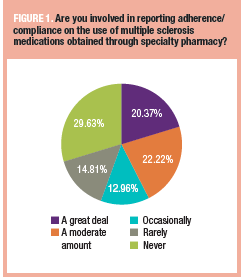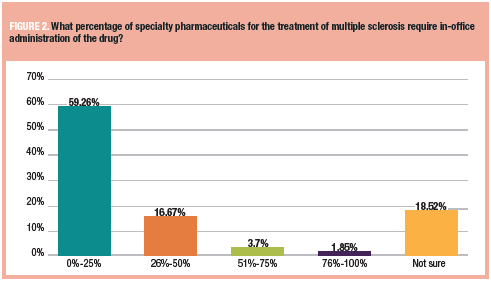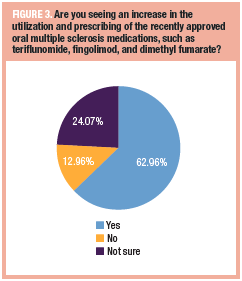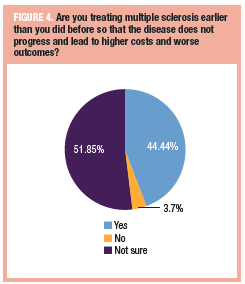Specialty Pharmacy Trends Report: Multiple Sclerosis
Multiple sclerosis (MS) is an autoimmune disease that affects the central nervous system. The body’s immune system attacks the protective sheath of nerve cells in the brain and spinal cord, causing symptoms such as numbness, speech and muscular coordination impairment, and blurred vision. According to the National Institute of Neurological Disorders and Stroke, approximately 250,000 to 350,000 people in the United States are diagnosed with MS. Twice as many women are affected by MS than men, and the disease is more common in people who live in colder climates.
According to the Rocky Mountain MS Center, the combined direct and indirect costs of MS are estimated to be $57,500 per-patient, per-year. The total lifetime costs associated with MS for a patient are estimated to be $2.2 million. While there is no cure for MS, a number of treatment options exist. Specialty pharmacy treatments include a range of self-injections for relapsing forms of MS, with frequency of use varying from 1 to 3 times per week. Other MS treatments are administered intravenously every 4 weeks in a hospital, infusion center, or a specially equipped doctor’s office.
__________________________________________________________________________________________________________________________________________________
When the survey participants were asked about their involvement in reporting adherence and/or compliance on the use of MS medications obtained through specialty pharmacy, 29.63% said “never,” 22.22% said “a moderate amount,” and 20.37% said “a great deal” (Figure 1).

A majority of survey participants (59.26%) said that between 0% to 25% of specialty pharmaceuticals for the treatment of MS require in-office drug administration at their facility, while 18.52% said they were unsure, and 16.67% said between 26% to 50% (Figure 2).

In terms of the utilization and prescribing of recently approved oral MS medications, 62.96% of survey respondents said they have seen an increase in these oral medications, such as teriflunomide, fingolimod, and dimethyl fumarate, while 24.07% said they were unsure, and 12.96% reported no indicated increase in prescribing (Figure 3).

When the survey respondents were asked if they are treating MS earlier than they had previously so the disease does not progress, leading to higher costs or worsened outcomes, 44.44% said “yes,” while 51.85% said they were unsure (Figure 4).

Specialty pharmacy is a burgeoning field that continues to be of importance for managed care professionals. With the rates of chronic, high-cost conditions increasing, payers are eager to find ways to diffuse costs, while also providing patients with the best care possible. First Report Managed Care partnered with the National Association of Specialty Pharmacy to put together this Specialty Pharmacy Trends Report.
The information for this trends report was generated through a comprehensive survey developed via the collaborative efforts of an Advisory Panel of key thought leaders and the First Report Managed
Care editorial staff. This survey was then sent to a diverse pool of specialty pharmacy professionals. This is part 2 of a 3-part series we bring to you on the climate of specialty pharmacy as it relates to the managed markets. We hope that you find the information presented to be practical, informative, and compelling. We hope the survey results serve as a resource you can use in making future management decisions.
Survey Participant Demographics
Key thought leaders in the field of specialty pharmacy have provided the information collected in this Specialty Pharmacy Trends Report series. The following are the demographic responses, providing a snapshot of the survey participants and the organizations for which they are affiliated.
The Northeast is home to most of the survey participants (33.93%), while 28.57% of participants are in the Midwest, 10.71% in the Southeast, 10.71% in the Pacific, 10.7% in National regions, 3.57% in the Mountain region, and 1.79% said “not applicable.”
The majority of the survey respondents (60.71%) have a PharmD degree, while 39.29% have a BS in
Pharmacy, 17.86% have an MBA, 10.71% have an MS, and 5.36% have a PhD. A significant majority of survey participants (53.57%) have an RPh certification, while 17.86% have a BCPS, and 12.5% have a CSP.
When asked how long they have been in the specialty pharmacy field, 35.71% of survey participants said 0 to 5 years, while 28.57% said 11 to 20 years, and 26.79% said 6 to 10 years.
Mail-order specialty pharmacy is the primary facility of work for 23.21% of the survey participants. An additional 16.07% said their primary facility of work is an academic institution (not a university hospital), another 16.07% said a managed care organization, 14.29% said a retail specialty pharmacy,
and 10.71% said a consulting firm.
When asked what type of specialty pharmacy they are involved with, 26.79% of the survey respondents said independently owned (nonretail) and another 26.79% said pharmacy benefits manager. Another 16.07% of the survey respondents are involved with a health plan-owned specialty pharmacy and 14.29% are retail pharmacy owned.
Most of the survey respondents (39.29%) reported that they have 1% to 25% of patient interaction time on a monthly basis, while 28.57% said their role does not currently involve patient interaction.
When the survey participants were asked to select the top 5 therapeutic categories with which they are most involved, and with the option to select up to 5 areas, the results were the following:
• Oncology (69.64%)
• Rheumatoid arthritis (67.86%)
• Hepatitis C (64.29%)
• Multiple sclerosis (50%)
• Diabetes (37.5%)
• Crohn’s disease (35.71%)
• Psoriasis/Psoriatic arthritis (35.71%)
• HIV/AIDS (25%)
• Hemophilia (23.21%)
• Immunoglobulins (12.5%)
• Cystic fibrosis (8.93%)
• Hereditary angioedema (5.36%)
• Gout (3.57%)
• Infertility (1.79%)




















